#my biggest thing is just not being here for how much moffat made her obsessed w him and have her entire life revolve around him
Text
current struggle in putting together my ideas for this portrayal is being unable to decide just how chaotically divergent i wanna get
#i could entirely scrap her being amy and rory's kid#but tbh it wasn't a terrible twist#but it was still weird ish#don't love doc marrying his besties child even if he didn't watch her grow up idk it's wEIRD#but it could be so hard to just scrap that entire thing esp if i wanna interact w ponds#my biggest thing is just not being here for how much moffat made her obsessed w him and have her entire life revolve around him#and making the entire 'love story' feel infantilized and overly produced and contrived bc he couldn't value simplicity and humanity#he couldn't just let the doctor be human enough to fall in love w a woman who was his intellectual equal#a woman who couldn't just keep up w him but challenged him#she had to be a magical tardis baby who was raised to kill him and threw a tantrum to get him to marry her#like i just#it felt so disappointing compared to the woman we first meet in her introduction#i want her to be her own person with her own beautiful story who happens to be tragically in love w a time lord
1 note
·
View note
Text
The Dos and Don’ts of Writing Smart Characters
Since I started this blog, one of the most common questions I’ve received has to do with the portrayal of intelligent characters. This is also one of the most difficult to answer -- excluding questions about characters with specialized knowledge sets, which are fairly easy to answer with source compilations. Most of the questions have to do with: how do you portray a smart character believably? How do you make the audience relate to them? Can I still make them likable? How do I avoid the pitfalls of popular media?
Well, I’m finally here to answer, utilizing examples from some of my favorite (and occasionally, not-so-favorite) media. Let’s jump in to the dos and don’ts of smart characters!
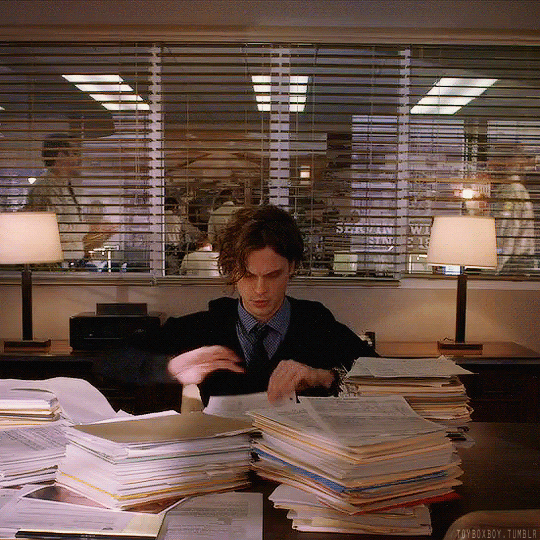
1. Do let the audience follow the character’s thought process.
As demonstrated by: Tommy Shelby from Peaky Blinders
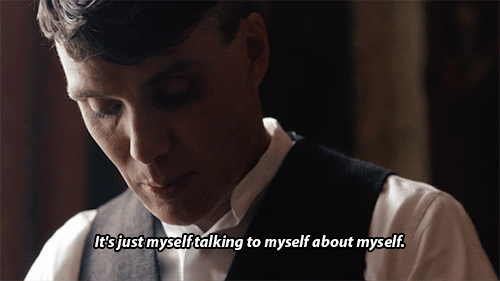
Albert Einstein allegedly once said, “If you can’t explain it to a five-year-old, you don’t truly understand it.” And the sentiment rings true: true genius doesn’t need to dazzle with big words and technobabble. Instead, it makes the complex appear simple.
The same rings true for brilliant characters. BBC’s Sherlock (more on that later) ceased to satisfy in its later seasons because it began to rely too heavily on visual glitz to avoid actually explaining its mysteries and how they were solved. Similarly, the biggest complaints with block buster franchises -- Star Wars, The Avengers, Game of Thrones -- is that they became obsessed with “subverting expectations” cleverly instead of leading the audiences to their most logical and satisfying conclusions.
Meanwhile, the smartest and most satisfying media dazzles not by staying over the audience’s head, but by illustrating how simplistic the solutions can be.
Let’s start with my boy Tommy Shelby, the charismatic, swaggering protagonist of the charismatic, swaggering crime drama Peaky Blinders. Using only his intelligence (and complete disregard for his own life/suicidal tendencies, but that’s not the point here), Tommy claws his way up from the near-bottom of the social ladder (an impoverished Romani in early 20th century Birmingham) to being a decorated war hero, to being the leader of a feared razor gang, to dominating the race track business, to becoming a business mogul, to becoming a member of parliament and trying to assassinate the leader of the fascist party. He’s also one of the paramount reasons why I’m bisexual.
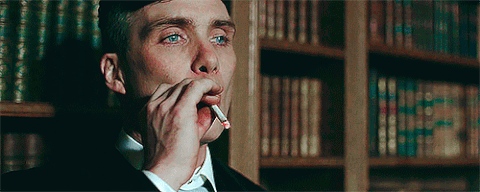
So how can such a drastic social climb be conveyed believably? Because Tommy -- as the viewpoint character -- is placed in seemingly inescapable situations, and then proceeds to demonstrate that the solutions to those situations have been there the whole time. I recently watched a brilliant video on how this is done, which can be viewed here.
Early in season one, for example, he responds to aggressive new methods by the police by organizing a mass-burning of paintings of the king, and uses the press this garners to publicly shame the methods of the chief inspector who’s been antagonizing him. In the next season, he talks his way into a deal by bluffing that he planted a grenade in his rival’s distillery. My personal favorite is in season four, when he responds to being outgunned by a larger, American gang by contacting their rival -- none other than an Alphonse Capone.
All of Tommy’s victories are satisfying, because they don’t come out of nowhere -- we have access to the same information he does, each victory is carefully foreshadowed, and we are reminded at every turn that failure is a very real possibility (more on that later.) So when he wins, we’re cheering with him.
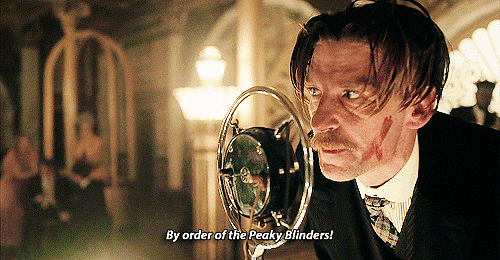
Other examples: Mark Watney from The Martian, who explains science in its most simplistic terms and with infectious enthusiasm. He would make every character on The Big Bang Theory cry.
Also, Miss Fisher from the AMAZING Miss Fisher’s Murder Mysteries. The dazzling, 1920s, female Sherlock Holmes of your dreams. I cannot recommend it enough.
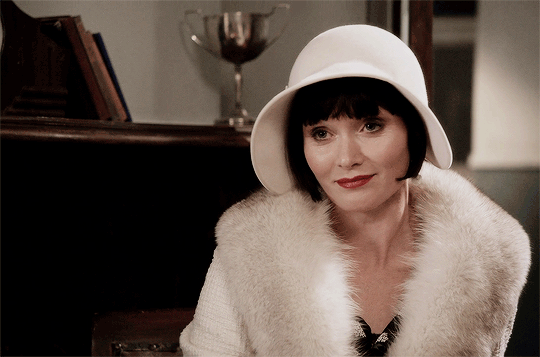
To apply this to your own writing: Remember you won’t dazzle anyone if you smack them in the face with a “brilliant” plot twist. They want to take a journey with your character, not be left in the dust.
Also, for everyone in my askbox concerned that they’re not smart enough to write intelligent characters, just remember how simple the problems confronting smart characters can be. Put them in a difficult situation, and provide them with a means of getting out. Then, just let them find it.
2. Don’t assume the audience is too stupid to keep up (or try to make them feel too stupid to keep up.)
As demonstrated by: Sherlock Holmes from BBC’s Sherlock.
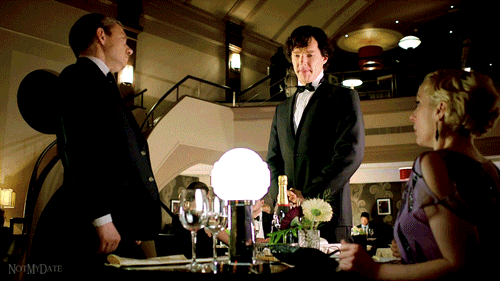
Say what you will: there were reasons why everyone was so captivated by this show during its first two seasons. It felt fresh. People had yet to become frustrated with the inescapable thirst for Benedict Cumberbatch. The writing was sharp, and the editing clever. And it wove a tantalizing web of mysteries that demanded solution. The problem was, there weren’t any.
The most frustrating for many was how Sherlock faked his death at the end of season two, after which devoted fans spent two years creating intricate theories on how he might have pulled this off. The creators responded by mocking this dedication in the opening episode of season three, by showing a fan club spinning outlandish theories (one of which included Sherlock and Moriarty kissing.) This might have been laughed off -- at the time, many seemed to consider it quite funny -- if the creators had bothered to offer their own explanation of how Sherlock survived. They didn’t. And so began a seemingly endless loop of huge cliffhangers that promised -- and consistently failed to deliver -- satisfying answers.
The most egregious examples occur in season four, which provided answers to questions no one asked, and withheld answers for things everyone wanted to know. For example, did you know that the real reason Moriarty engaged Sherlock is because he was hypnotized by Sherlock’s secret evil sister? The same one who killed Sherlock’s best friend, whom Sherlock convinced himself was a dog? Yes, that was a real plot point, in the climax of the series. It’s an effort to befuddle the audience with brilliant and unexpected writing, but instead pulled them out of a story they were already invested in and made them far more critical of its pre-existing faults.
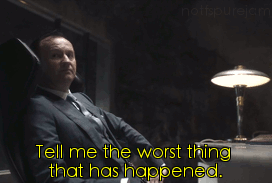
It’s pointed out in the brilliant (if bluntly named) Sherlock Is Garbage, And Here’s Why that Moffat can be a great writer, but is a consistently terrible show runner, because he’s more interested in dazzling the audience with cleverness than actually telling a satisfying story. The video also points out that the show often implied Sherlock’s brilliance, without ever letting the audience follow along with his actions or thought-process in a way that DEMONSTRATED his brilliance.
I highly recommend giving the aforementioned video a watch, because it is not only a great explanation of how Sherlock Holmes can be best utilized, but about how writing itself can be best utilized.
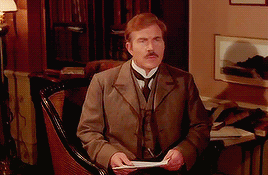
Other examples: The Big Bang Theory. As Wisecrack points out in their wonderful video on the subject, the punchline of every joke is “oh look, these characters are smart nerds!” which is repetitious at best and downright insulting at worst.
How to avoid this in your writing: Treat the audience as your equal. You’re not trying to bedazzle them, you’re trying to take them on a journey with you. Let them be delighted when you are. Don’t constantly try to mislead them or hold intelligence over their head, and they will love you for it. Also, cheap tricks do not yield a satisfying story: readers will know when you went into a narrative without a plan, and they won’t appreciate it.
3. Do remember that smart people can be kind and optimistic!
As demonstrated by: Shuri from Black Panther.
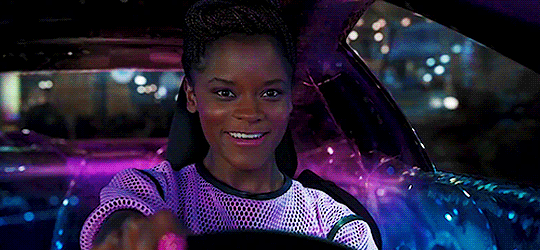
Yes, brilliant people can be unhappy and isolated by their intelligence, or rejected by society. But remember that intelligence isn’t synonymous with a cantankerous attitude, or an excuse to be a pugnacious ass to those around you!
Part of the reason why Shuri of 2018′s Black Panther was such a breath of fresh air was the fact that she subverted almost all preconceptions about how a genius looks, acts, and regards the world. And it’s not just the fact that she isn’t a sullen, middle-aged white man that makes her stand out: Shuri has an effervescent attitude, and genuinely loves contributing to her country and family. She referred to sound-proof boots as “sneakers” (and then explained the pun when her brother didn’t get it.) She’s fashionable. She teases her older brother, and cries when he is apparently killed. She’s up on meme culture. This makes her unlike pretty much every other genius portrayed in the MCU.
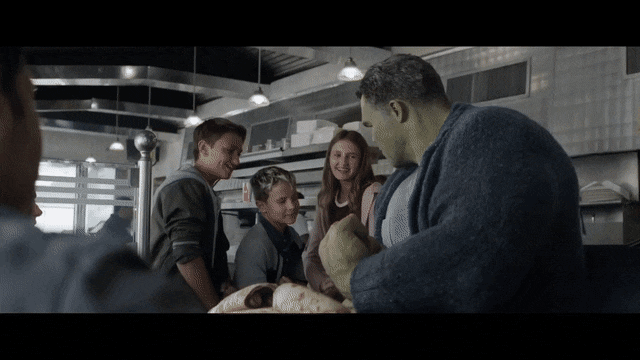
Except maybe the Hulk. He can dab now.
Shuri is also allowed to take pride in her genius, and can be a bit insufferable about it, which makes her more enjoyable and rounded. But she is an excellent example of how genius can be explored and portrayed in fiction, and I will forever be embittered that she was underutilized in Infinity War and Endgame.
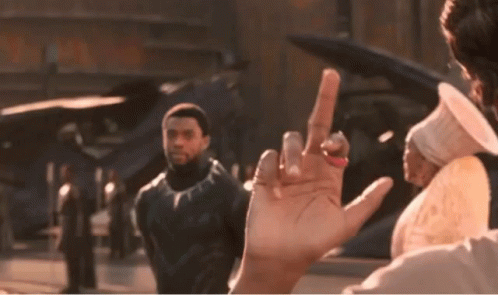
Why, for example, are all geniuses portrayed as arrogant misanthropes? Albert Einstein battled depression, but he is also said to have enjoyed blowing bubbles and watching puppet shows. He was kind to those who knew him. Similarly, Alan Turing behaved little like his fictional counterpart, described as “shy but outgoing,” with a love of being outdoors. Nikola Tesla fell in love with a pigeon. Why do we have to portray these people so damn gravely?
Other examples: Spencer Reid from Criminal Minds. Also an excellent portrayal of an intelligent person on the autism spectrum, as he struggles to interface socially but cares profusely for his fellow human beings. He is brilliant, and completely precious.
Also, Sherlock Holmes -- the original version, and all faithful adaptations thereof. Anyone who thinks Sherlock is an austere, antisocial jerk isn’t familiar with the original canon. He blushed when Watson complimented his intelligence, for God’s sake.
Then there’s Elle Woods from Legally Blonde and Marge from Fargo. Brilliant, upbeat, optimistic geniuses.
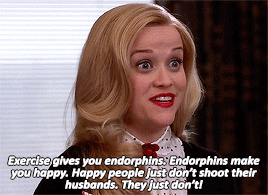
To apply this to your own writing: If you have a smart character who hates everyone around them for no identifiable reason, ask yourself why this is necessary and what this adds to the plot. Are they angry about injustice, towards themselves or others? Are they frustrated with an inability to relate to people? Do they want to protect themselves or their family at all costs, including politeness? If not, question why your brilliant character can’t also be kind to those around them.
4. Don’t make your character perfect at everything they do.
As demonstrated by: Wesley Crusher from Star Trek: The Next Generation.
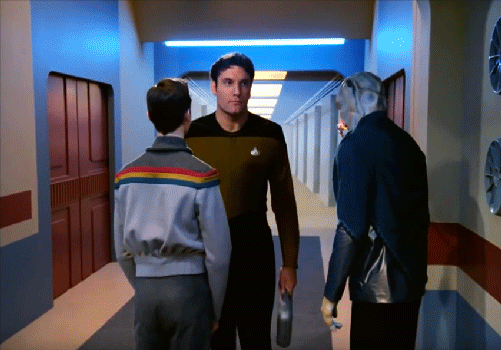
Ah, Wesley. Some call him the original Mary Sue, and it’s one of the only times I’ve seen the term applied with some accuracy. He is somehow the most gifted and least qualified person on The Enterprise. He’s Hermione Granger without the charm, jumping in to answer questions before any of the trained officers in the room have the chance to, always in the right. His only obstacle? Why, the boorish adults he’s surrounded with simply don’t understand his brilliance!
As early as the series’ very second episode, Wesley -- inebriated by an alien illness -- forcibly takes over the ship from Captain Picard, only to later save it from a threat with a reverse tractor beam of his own design.
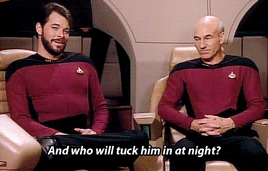
Wesley was obviously inserted as a means of attracting younger viewers, but failed egregiously, because he was too annoyingly perfect for kids to relate too, and not cool enough for them to be invested in. I binge-watched the various Star Trek series in my youth for Spock, Data, and my wife Seven of Nine, not to watch seasoned military and scientific officers get lectured by an adolescent. Even Wil Wheaton, who had the misfortune of portraying this character, expressed a dislike for him.
Precocious children are great, if you get them right. But get them wrong, and they can easily become your most annoying character, marring the face of otherwise great media. The most important thing you can do for a brilliant character is endow them with weaknesses and flaws -- even something as small as Shuri’s fondness for teasing her older brother made her enjoyable, as anyone with siblings could relate to their dynamic.
But, what if you want a supernaturally talented character who not only fails to be a ray of sunshine, but is something of an arrogant, antisocial jerk? Can they still work, especially if they also happen to be a child?
Yes, under one extremely important condition:
5. Do keep your characters out of their depth!
As demonstrated by: Number Five from Umbrella Academy.
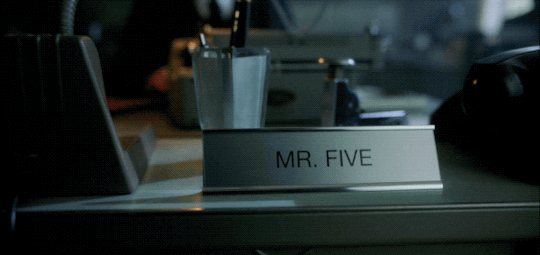
Okay, he’s not exactly a child. He’s a fifty-eight-year-old trapped in a child’s body, who’s traveled back in time from a post-apocalyptic future to warn his siblings of an incoming Armageddon. In other news, Umbrella Academy is a weird show. Unlike the comics, however, the apes don’t engage in prostitution.
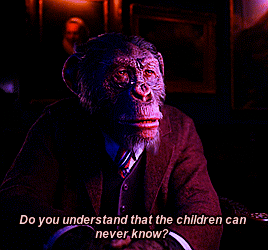
The effect, however, remains the same: a preternaturally talented child who talks down to everyone around him, including his (apparently) older siblings. So why does he work while Wesley fails so egregiously?
For one thing, it’s demonstrated early on that Five has the skills to back up his sanctimonious attitude, with the delightfully ultraviolent Istanbul (Not Constantinople) sequence. It also helps that he lacks Wesley’s squeaky-clean moral code, to the point at which he can get drunk in public or kill without remorse.
But: the element most vital to his success as a character is the fact that he’s kept completely, and consistently, out of his depth. He knows the world will end in eight days, but he doesn’t know how this will transpire or how to stop it. Ultimately, he fails again to stop the apocalypse, and must travel back in time with his siblings for another chance.
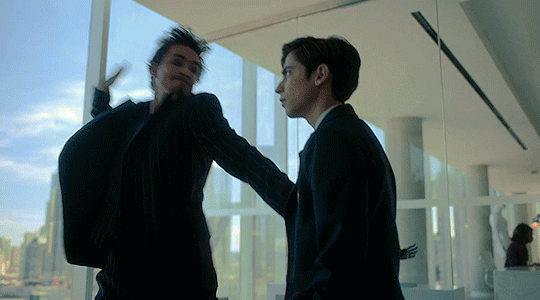
Most authors have the impulse to demonstrate a character’s brilliance by allowing them to succeed against insurmountable odds, but the Umbrella Academy writers show tremendous wisdom in allowing Five to fail. This allows the audience to empathize with him, and countermands the effects of his arrogant attitude.
This advice isn’t just true for pint-sized prodigies. Look back over this list, and take notes of how often the most successful characters are allowed to fail, to have flaws, and to ascend past their comfort zone.
Other examples: Virtually every successful example on this list.
Tommy Shelby, a character of limitless ambition, conducts a new, perilous climb outside of his social rank each season, which almost always puts him in positions of mortal danger. He faces threats both external (rival gangs, evil priests, and rising fascists) and internal (hello PTSD, suicidal tendencies, and crippling addiction) but either way, we understand that his fast-paced climb is not for the weak-willed or faint-hearted.
Mark Watney is a brilliant scientist who has been stranded in an utterly impossible situation for which absolutely no one could be adequately prepared (spoilers: it’s on Mars.) We are drawn in by his plight, and how he could possibly escape from it, and there we come to admire him for his courage, optimism, and humor.
Shuri, though not the main character of Black Panther, is allowed to show off both tremendous gifts and vulnerability, as she is powerless to stop the apparent death of her beloved older brother. She watches Wakanda’s takeover both as an innovator and a young woman, and a large reason for her success is that she is allowed to be both.
How to apply this to your writing: When portraying intelligent characters, take stock of how often they fail, their level of control over their surroundings, their vulnerability, and their flaws. We don’t want to read about flawless deities. We want to read about characters who embody and personify our humanity. So remember they need to fall down in order to pull themselves up.
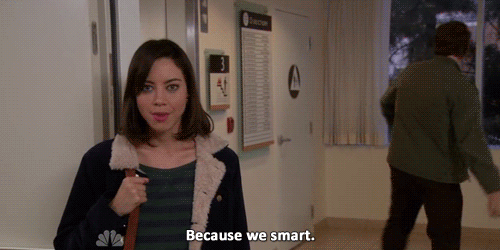
Happy writing, everybody!
#long post for ts#writing tips#writing smart characters#peaky blinders#tommy shelby#mark watney#the martian#miss fisher's murder mysteries#shuri#black panther#spencer reid#criminal minds#legally blonde#fargo#number five#the umbrella academy#star trek#star trek: the next generation
917 notes
·
View notes
Note
3, 13, 28 & 29. Also, I hope you're having a wonderful day! :)
Ahh thank you! I am having a wonderful day, hope you’re having one too :)
Thoughts on the current Doctor 3. Favourite Quote
I was so so tempted to say that speech from The Doctor Falls about kindness, but then I realised what my favourite quote actually is, and I mean...it really couldn’t be anything else:
“What if you were really old, and really kind and alone? Your whole race dead. No future. What couldn't you do then? If you were that old, and that kind, and the very last of your kind, you couldn't just stand there and watch children cry....All that pain and misery and loneliness, and it just made it kind.”
I actually got a little teary just copying and pasting that quote oh. my. gosh. The Beast Below is Moffat’s most underrated masterpiece - I won’t get into that now because I’d be here for days raving about it - instead, I’ll just say that...this is it. In retrospect, this is it. This is the episode, this is the moment in which Moffat establishes his vision. His game-plan. His Doctor Who. That glorious speech in The Doctor Falls? it all comes from this, from a little (and yet...so huge) thing Amy Pond once said to The Doctor a long time away on Starship UK. It says everything we need to know about The Doctor under Steven Moffat, it says everything we need to know about not just Amy Pond (whose most shining character trait, much like The Doctor themselves, is her kidness) but about The Companion under Steven Moffat. “My friends have always been the best of me.” says The Doctor, and they have! Clara changing The Doctor’s mind about Gallifrey? Clara’s wonderful speech to baby-doc in Listen? It all comes from The Beast Below. This is where everything I hold dear about the Moffat era derives from, how could any other quote ever come out in-front!?
13. First story you saw on TV
Rose! I #SatDownWithTheFamily as a tiny eight-year-old on the 26th March 2005 at 7:00pm to watch what I assumed was...a medical show about some Doctor who lived in a house that was super big inside or...something...I had no clue what I was getting myself into, but I’d truly never seen anything like it on TV before and around 20 minutes in I was flat-out hooked for. life. I don’t think I’ve ever fallen for somthing so fast ever lol. Like..light switch fast. In the span of 45 minutes I suddenly like...had found my first ever real, proper, obsession. I can to this day remember being that person who just wouldn’t shut up about it at school that next Monday morning, I drove everyone MAD!
28. Anything you want to see in the next season
I have IDEAS.
Primarily, I want change. I know that goes against the grain of ye-olde-docteur-who-fan but the changes in the show are so so SO exciting to me. I love Moffat’s era with my whole heart, but I am so here for a new...everything. New intro, new TARDIS, new logo, new theme music, (new composer altogether?) Series 5 is seven years old now, and every time I watch it I still get that “EVERYTHING IS SO DIFFERENT OMG” feeling that I got when The Eleventh Hour first aired, it’s timeless!
In terms of like..specifics...I really would love for the show to expand it’s characters a little and give us more of an ensemble cast. A group of 4 companions + Thirteen would be perfect I think. If Game of Thrones/The Sopranos’ HBO style storytelling has given audiences anything beyond a fetish for....bleak TV, it’s an appreication for exploring how a range of fleshed-out characters interact with eachother - I’m not Game of Thrones’ biggest fan at all but even I squealed a little when Jon finally met Dany. I think Chibnall’s work on Broadchurch really lends itself to that kind of showrunning. We could have a companion from the past (@ Chibs I think Helen of Troy would make a wonderful Who companion Just Saying Just Saying), our routine Contemporary Earth Companion and then maybe a pair of siblings from a future colony or something.
If Chibs only has one companion, then I would want them to stick to a young-ish Contemporary Earth based character. The audince surrogate thing works wonderfully. and I’d like to see it stay. Contrary to popular opinion I do think this specific companion-prototype should be a male companion this time around. I think it could make for some quietly revolutionary storytelling. Just imagine a wistful 20-something London boy dreaming about space and exploring the universe Luke Skywalker style. He’s bubbly and energetic, rather than hyper-masculine and dashing. He’s in total awe of The Doctor and sees her as his role-model. Picture that, the young man being mentored and inspired and shown the wonder of the universe by the woman. That’s an exciting, fresh, and subversive dynamic, and a dynamic fully worth exploring inmy opinion.
Also, tight and expansive full-out season story arcs!!!! I know many fans want a return to flat-out standalones but gosh TV can do so much better than just an unconnected bunch of stories now. Let’s have a proper, running, story arc ala Series 5. A little like The Dalek Master Plan or The Keys of Marinus but even bigger in scope and in stakes. Let’s go Chibs don’t ltet m down!
29. Thoughts on the current Doctor
My absolute, without-a-doubt favourite Doctor. So gentle, and righteous and not the least egotistical. With a clear and defined character arc that’s simple enough for guest writers to not...fuck up and cause inconsistency. (The Lie of the Land notwithstanding)
Also, the most wonderful Doctor is so delicately and completely genuinly masterfully played by the most wonderful human being in Peter Capaldi. So...even more amazing. He’s not only a magical actor, but he’s a magical person and a magical ambassador for the show. I’m going to be so sad seeing him go.
x
#for all everyone else who asked questions i'm on them i swear I just waffle a lot so it takes me a while to write out answers to the questio#what can I say I have a lot to say#ask#lullapiee
11 notes
·
View notes